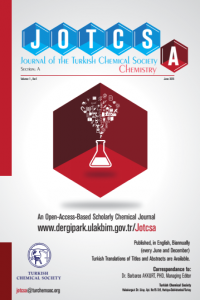Abstract
Pesticides are among the most extensively chemicals used in the world today and they are also among the most hazardous compounds for the human. This study was designed to use the plasmid relaxation assay to describe the association of markers of DNA damage with pesticide exposure. The DNA damage activity of fluoxastrobin and imazamox were checked on pBluescript M13+ plasmid DNA (3.2 kb) in the absence and presence of Cu(II) ions.
It has been found that the fluoxastrobin and imazamox can effectively promote cleavage of plasmid DNA in the absence and presence of Cu(II) ions. DNA cleavage was found to be concentration and dependent.
In conclusion, the present study showed that fluoxastrobin and imazamox can induce DNA damage, which warrants for further investigations to correctly evaluate the hazards of exposure to these chemicals.
References
- Fernández-Alba AR, Guil H, López GD, Chisti Y. Comparative evaluation of the effects of pesticides in acute toxicity luminescence bioassays. Analytica Chimica Acta. 2002; 451:195–202.
- Vrankovic J, Labus-Blagojevic S, Csanyi B, Makovinska J, Cvetkovic O, Gacic Z, et al. Antioxidant enzymes and GST activity in natural populations of Holandriana holandrii from the Bosna River. Turkish Journal of Biology. 2012; 36:477-85.
- Hanazato T. Pesticide effects on freshwater zooplankton: an ecological perspective. Environmental Pollution. 2001; 112:1-10.
- Lioi MB, Scarfı MR, Santoro A, Barbieri R, Zeni O, Di Berardino D, et al. Genotoxicity and oxidative stress induced by pesticide exposure in bovine lymphocyte cultures in vitro. Mutation Research/Genetic Toxicology and Environmental Mutagenesis. 1998;403:13-20.
- Fragiorge EJ, Rezende AAAd, Graf U, Spanó MA. Comparative genotoxicity evaluation of imidazolinone herbicides in somatic cells of Drosophila melanogaster. Food and Chemical Toxicology. 2008; 46(1):393-401.
- Bolognesi C. Genotoxicity of pesticides: a review of human biomonitoring studies. Mutation Research/Reviews in Mutation Research. 2003; 543(3):251-72.
- Grube A, Donaldson D, Kiely T, Wu L. U.S. EPA Pesticide Market Estimates: 2006-2007. Office of Pesticide Programs. Washington, DC 2011.
- Parrón T, Requena M, Hernández AF, Alarcón R. Association between environmental exposure to pesticides and neurodegenerative diseases. Toxicology and Applied Pharmacology. 2011; 256:379-85.
- Bolognesi C, Morasso G. Genotoxicity of pesticides: potential risk for consumers. Trends in Food Science & Technology 2000; 11:182-7.
- Mostafalou S, Abdollahi M. Pesticides and human chronic diseases: Evidences, mechanisms, and perspectives. Toxicology and Applied Pharmacology. 2013; 268(2):157-77.
- Çeken B, Kízíl M. Synthesis and DNA-cleaving activity of a series of substituted arenediazonium ions. Russian Journal of Bioorganic Chemistry. 2008; 34(4):488-98.
- Toptancı BÇ. (+)-Duocarmycin Antibiyotiği Analoglarının Sentezlenmesi ve DNA Üzerine Etkilerinin Araştırılması. Dicle University, Science Faculty, Chemistry Department, PhD Thesis. 2013.
- Bagchi D, Bagchi M, Hassoun E, Stohs S. In vitro and in vivo generation of reactive oxygen species, DNA damage and lactate dehydrogenase leakage by selected pesticides. Toxicology. 1995; 104(1):129-40.
- Ojha A, Yaduvanshi SK, Pant SC, Lomash V, Srivastava N. Evaluation of DNA damage and cytotoxicity induced by three commonly used organophosphate pesticides individually and in mixture, in rat tissues. Environmental Toxicology. 2013; 28(10):543-52.
- Nazeem S, Azmi AS, Hanif S, Kumar KS. Reactive Oxygen-Dependent DNA Damage Resulting from the Oxidation of Plumbagin by a Copper-redox Cycle Mechanism: Implications for its Anticancer Properties. Austral - Asian Journal of Cancer. 2008; 7:65-72.
- Chester F. The copper salts as fungicides. The Journal of Mycology. 1890; 21-4.
Abstract
References
- Fernández-Alba AR, Guil H, López GD, Chisti Y. Comparative evaluation of the effects of pesticides in acute toxicity luminescence bioassays. Analytica Chimica Acta. 2002; 451:195–202.
- Vrankovic J, Labus-Blagojevic S, Csanyi B, Makovinska J, Cvetkovic O, Gacic Z, et al. Antioxidant enzymes and GST activity in natural populations of Holandriana holandrii from the Bosna River. Turkish Journal of Biology. 2012; 36:477-85.
- Hanazato T. Pesticide effects on freshwater zooplankton: an ecological perspective. Environmental Pollution. 2001; 112:1-10.
- Lioi MB, Scarfı MR, Santoro A, Barbieri R, Zeni O, Di Berardino D, et al. Genotoxicity and oxidative stress induced by pesticide exposure in bovine lymphocyte cultures in vitro. Mutation Research/Genetic Toxicology and Environmental Mutagenesis. 1998;403:13-20.
- Fragiorge EJ, Rezende AAAd, Graf U, Spanó MA. Comparative genotoxicity evaluation of imidazolinone herbicides in somatic cells of Drosophila melanogaster. Food and Chemical Toxicology. 2008; 46(1):393-401.
- Bolognesi C. Genotoxicity of pesticides: a review of human biomonitoring studies. Mutation Research/Reviews in Mutation Research. 2003; 543(3):251-72.
- Grube A, Donaldson D, Kiely T, Wu L. U.S. EPA Pesticide Market Estimates: 2006-2007. Office of Pesticide Programs. Washington, DC 2011.
- Parrón T, Requena M, Hernández AF, Alarcón R. Association between environmental exposure to pesticides and neurodegenerative diseases. Toxicology and Applied Pharmacology. 2011; 256:379-85.
- Bolognesi C, Morasso G. Genotoxicity of pesticides: potential risk for consumers. Trends in Food Science & Technology 2000; 11:182-7.
- Mostafalou S, Abdollahi M. Pesticides and human chronic diseases: Evidences, mechanisms, and perspectives. Toxicology and Applied Pharmacology. 2013; 268(2):157-77.
- Çeken B, Kízíl M. Synthesis and DNA-cleaving activity of a series of substituted arenediazonium ions. Russian Journal of Bioorganic Chemistry. 2008; 34(4):488-98.
- Toptancı BÇ. (+)-Duocarmycin Antibiyotiği Analoglarının Sentezlenmesi ve DNA Üzerine Etkilerinin Araştırılması. Dicle University, Science Faculty, Chemistry Department, PhD Thesis. 2013.
- Bagchi D, Bagchi M, Hassoun E, Stohs S. In vitro and in vivo generation of reactive oxygen species, DNA damage and lactate dehydrogenase leakage by selected pesticides. Toxicology. 1995; 104(1):129-40.
- Ojha A, Yaduvanshi SK, Pant SC, Lomash V, Srivastava N. Evaluation of DNA damage and cytotoxicity induced by three commonly used organophosphate pesticides individually and in mixture, in rat tissues. Environmental Toxicology. 2013; 28(10):543-52.
- Nazeem S, Azmi AS, Hanif S, Kumar KS. Reactive Oxygen-Dependent DNA Damage Resulting from the Oxidation of Plumbagin by a Copper-redox Cycle Mechanism: Implications for its Anticancer Properties. Austral - Asian Journal of Cancer. 2008; 7:65-72.
- Chester F. The copper salts as fungicides. The Journal of Mycology. 1890; 21-4.
Details
| Journal Section | Articles |
|---|---|
| Authors | |
| Publication Date | January 8, 2017 |
| Submission Date | July 17, 2016 |
| Published in Issue | Year 2016 Volume: 3 Issue: 3 |



